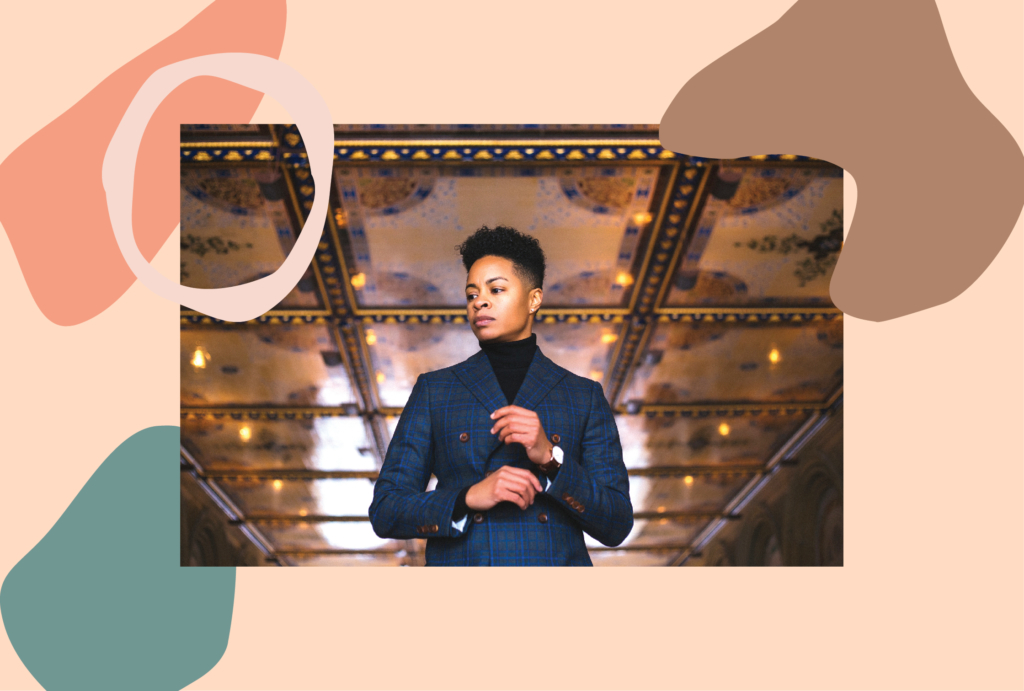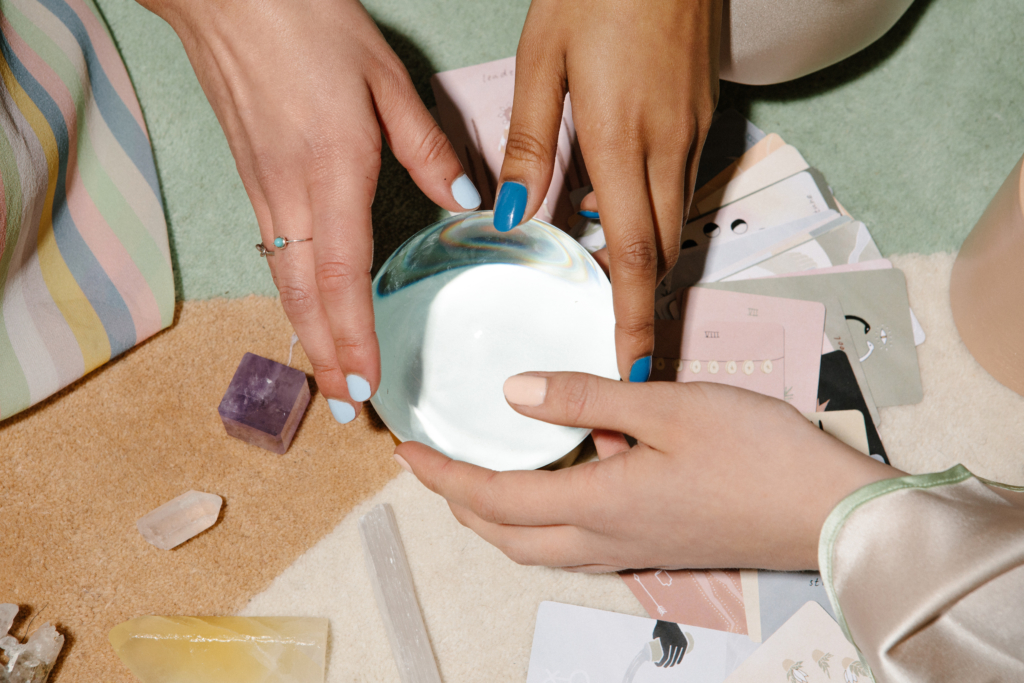
With social media power comes great responsibility. Yes, influencers post amazing pictures, attend all kinds of events, and work with really cool brands, but at the end of the day, they’re also baring their personal lives for the world to see. And for queer-identifying influencers, there’s a whole other level of openness that comes with running a large online platform.
For this story, I spoke with five queer trailblazers about what it’s been like for them to share their paths on social media and become a source of education and inspiration for people on the LGBTQ+ spectrum who deserve to see influential figures who look (and live) like them.
Danielle A. Cooper
Danielle A. Cooper is a blogger, a fashion activist, a panelist, and word traveler. Her blog, “She’s A Gent,” went live in 2014 and instantly became a hit for women and androgynous people who look dapper AF in menswear. “For me, ungendering fashion is me being non-traditional and not conforming to what people think I should or shouldn’t be,” she says.
Seeing the impact that her (amazing) pictures in tailored suits were having inspired Cooper to come out to her followers two years ago during the Nike Be True campaign. The response, she says, has been amazing. What started as a place to share personal style quickly grew into a multi-faceted publication for the LGBTQ+ and QPOC communities to find content they identify and relate to. In addition to writing about beauty, music, fitness, and of course, style, Cooper also shares tips about LGBTQ+ and POC-friendly destinations for people to travel to and feel safe in (#blackgirlstraveltoo).
She told me that she didn’t have any queer, masculine-presenting women of color role models when she was younger (thankfully, that’s changing now with icons like Lena Waithe), so filling that role for other people has helped her make sure she’s taking everybody’s experiences and needs into consideration when she creates content. “I never found someone on the spectrum that I could look up to, so that’s another reason I put so much energy and love and passion into my blog, because I feel like I’m paving the way for another generation to be like ‘Hey, I have somebody I can look up to,” she says.
Ultimately, Cooper hopes her platform helps other people “feel free enough to be YOU!”
Stevie Boebi
Stevie Boebi is a YouTuber who makes sex education videos geared towards lesbians. Although she’s been sharing videos since 2006, she didn’t start teaching about sex until she opened up to her subscribers about her sexual orientation. They had a LOT of questions. “I came out and young girls were asking me what I thought were silly questions,” she said. “Then I was like, ‘Fuck. Of course, they don’t know that. No one’s telling them. There’s no lesbian sex ed [out there].”
So, last year, Boebi set off to fix that. Now more than 634,000 subscribers later, she’s found that her channel is a big source of information for people of all ages. She says it’s incredibly rewarding to fill that gap for women who are left in the dark about how to have pleasurable and safe sex, but she also worries about the unique challenges that queer YouTubers face. She explained to me that videos about LBTQIA identities and experiences are often flagged as having “unfriendly” content — much like videos of violence, politics, etc — and demonetized. If you’re not familiar with YouTube lingo (it’s cool, neither am I! Thanks for the help, Stevie), this means the videos are deemed unsuitable for advertisers, so in addition to not having ads on them (aka, not giving the YouTuber money), they also don’t appear in queues or automated playlists for related videos.
“Being seen as not ad-friendly is such proof that we need more education and more visibility than we already have,” Boebi concluded. Company partnerships are a crucial way for influencers to make an income and grow their brand — and their sexual orientation should never be a reason for them to miss out on those opportunities. In the future, Boebi would love to collaborate with brands such as Audi, Doritos, and 5 Hour Energy — just sayin’.
Gia Narvaez
Gia Narvaez is a body positive fashion influencer and YouTuber who gets real with her followers about her experience as a transgender Latina. “I think I started being so open because when I first started my transition, there was no one that I felt I could look up to in the trans community,” she told me. “A lot of people I saw were thin, gorgeous, light-skinned, etc. So I thought, well, there isn’t anyone that looks like me (plus-size and brown), perhaps I can document it and maybe one day I can help someone out there.”
And she has. Apart from serving looks on the daily, Narvaez writes captions encouraging her followers to love their bodies, recognize their beauty, and own their resilience. She says her physical transition is what inspired her to talk about body positivity, but her platform is also about providing a safe space to talk about all of the mental and emotional struggles trans women go through.
“I think that by having [an] open and respectful discussion about our identities and experiences, we can slowly start turning the tide and move towards a more accepting future. A future where our queer kids aren’t bullied or kicked out of their home because of their identity. A future where trans women of color aren’t murdered by the age of 35 just because of who they are. A future where we are accepted and seen as any other human that is just trying to live their life like anyone else,” continued Narvaez.
Dan Owens-Reid
Dan Owens-Reid is a manager, social media consultant, activist, and fashion entrepreneur. In addition to helping influencers grow their brands and effectively communicate with their audiences, Dan (who uses both he and she pronouns) is incredibly open and vulnerable with his followers about her journey to accepting his body as a genderqueer person — which, ultimately, led her to launch Radimo, a genderless vintage clothing company.
“For me, personally, it was a matter of life and death. I really, really hated myself. I hated my body, I felt like it was against me…Instead of shopping in the women’s section or feeling uncomfortable and unsafe shopping in the men’s section, I started to look outside of all that,” he told me. Radimo takes the same piece of clothing, and styles it different ways on different people with different body types, proving that anyone can rock a skirt or jacket in their own way without needing to label it according to what body parts they have. “I haven’t seen any other brand do this, but I’m hoping it catches on,” Owens-Reid says. “All any of us are asking for is the opportunity to see ourselves reflected in fashion.”
For Owens-Reid, being honest with her followers about identifying as masculine, feminine, neither and both has made it so much easier to accept and love who he is, and inspire others to do the same. Although she doesn’t want to constantly explain herself to “randos on the street,” as he puts it, the Internet provides a perfect space to relate to other people who don’t want to be put in a box. “I hope I can give people something to look to that helps them understand themselves. I feel like that’s kind of why I was put on earth,” she says.
Zara Barrie
Zara Barrie is a writer, digital content creator, talk show host, and Executive Editor of Go Magazine. The self-identified “mascara lesbian” isn’t scared to talk about taboo topics in her articles — which is why she’s built a community of women who are tired of being quiet about their sex, mental health, and love lives.
“I get a lot of letters! 100s a day! Women often feel like they can share their stories with me—the stories they’ve been too ashamed to discuss with anyone else,” she told me. “I read every single one and feel honored that they feel I’m a safe person to share with. Sometimes just writing it out is half the battle. Getting it out of your system and into the ether.”
Barrie says she’s humbled to inspire others to talk openly about who they are and, ultimately, create more spaces for women and queer people to become unfiltered influencers.
“Often there is pressure to be the perfect ‘role model’ when you’re representing a marginalized demographic, but I think the most powerful thing an influencer can do is be open about their day-to-day struggles,” she says. “To discuss the nuances of being a human. To talk about the wonderful queer parties, but the soul-crushing hangovers, too. To talk about the wonderful dates, but the heartbreaks as well; the highs and the lows. That’s what really connects queer kids to you; being real and being accessible.”
–
Feature Image via Danielle A. Cooper/Graphic via Madison Terry

